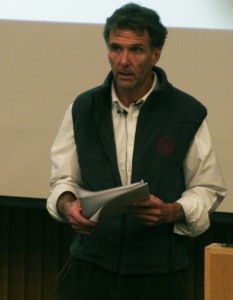
Drue Sokol, Photo Editor
Acclaimed journalist and UR alumnus Tom Wilber ’83 gave a talk on hydrofracking and his recently published book, “Under the Surface: Fracking, Fortunes and the Fate of the Marcellus Shale,” on Tuesday, April 24 in Hubbell Auditorium.
The event, which was co-sponsored by the UR Department of Earth and Environmental Sciences, was well-received and attended by nearly one hundred Rochester residents and members of the University community.
Wilber presented his book as a “narrative about the lives of people affected in various ways by shale gas prospecting and drilling” in the Twin Tiers region encompassing New York state and northern Pennsylvania — a story he describes as “fascinating.”
Wilber worked as a journalist for 20 years — 17 of which were with Binghamton’s Press & Sun-Bulletin, where he covered everything from business to environmental sustainability. He was also among the first journalists to extensively watchdog hydrofracking activity in the South Tier.
Hydrofracking, short for hydraulic fracturing, is the forcing open of fissures in subterranean rocks by introducing liquid at high pressure, primarily done to extract oil or gas. He cited the fracking industry’s “long-obscured dealings and rarely held responsibility” as primary reasons for his interest in the issue.
He spoke extensively about the environmental hazards of fracking, which include the use of harsh anti-corrosives and lubricants to create a “slick water frack” solution. This mixture is necessary in overcoming the ground’s resistance and creating enough force to shatter the rock and release the gas. Excess consumption of water, improper disposal of slick water frack chemicals and land degradation are all problems as well.
Nevertheless, hydrofracking is seen by others as a bonanza for landowners badly hit by the economic recession. Many such populations believe hydrofracking serves national interests and will revitalize America’s rural communities.
Acknowledging the complex question of whether hydrofracking should be further implemented, Wilbert remains receptive to arguments on both sides of the debate.
“I’m learning new things everyday and am open to the possibility that my personal views are not infallible,” he admitted.
In the meantime, he encouraged audience members to deviate from “happy consumers of cheap abundant energy” and “give more thought when [they] crank up the AC, fire up the stove or switch on the light.”
Wilber graduated from UR with a bachelor’s degree in English and holds a master’s in communications and print journalism from the S.I. Newhouse School of Public Communications at Syracuse University.
He currently lives with his wife and two children in Union, N.Y.
For more information on Wilber’s book, visit Facebook.com/frackingandfortunes.book.
Gould is a member of the class of 2014.


